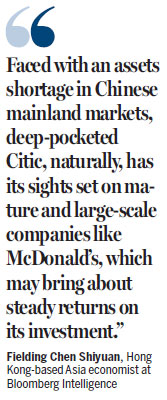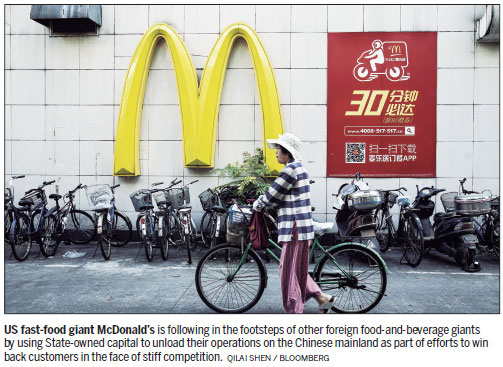Citic buys McDonald's operations in China
Updated: 2017-01-13 07:56
By Luo Weiteng in Hong Kong(HK Edition)
|
|||||||||
Its controlling stake in the fast food giant's mainland and HK business is a major foray into unknown territory
US food giant McDonald's headline-grabbing sale of its operations on the Chinese mainland and in Hong Kong to a conglomerate comprising Citic and US private equity Carlyle Group marks a major foray into virtually unknown territory by the vast State-owned Citic group.
Citic, which has extensive business interests ranging from energy and manufacturing to real estate, calls the purchase a "bold move" in its bid to secure a foothold in the fast-growing consumer goods sector.
The protracted negotiations on McDonald's sale, lasting almost nine months, ended with Citic and Carlyle scooping up a majority interest in the fast-food titan for up to $2.08 billion.

Citic, acting as the master franchisee responsible for McDonald's operations in the two regions for a term of 20 years, took a controlling 52-percent stake, with Carlyle acquiring 28 percent and McDonald's keeping the remaining 20 percent.
McDonald's followed in the footsteps of other foreign food-and-beverage giants Coca Cola and Yum Brands, which runs the Kentucky Fried Chicken and Pizza Hut chains, in using State-owned capital to unload part or all of their operations on the Chinese mainland, reflecting the same predicament they're in, in fending off growing competition and rejuvenating their aging brands and winning back customers.
As of late last year, McDonald's vast pool of restaurants on the mainland in Hong Kong stood at 2,400 and 240 outlets, respectively, some of which had already been franchised, the company confirmed to China Daily in an email.
The $2.08-billion deal will see some 1,750 McDonald's eateries in the regions franchised to the new owners, putting the fast-food giant on course to fulfill its turnaround plan to refranchise 4,000 company-operated stores globally by the end of next year, and have 95 percent of its international outlets owned by franchisees in the long run.
Citic, founded in 1979, is best known for its operations and investments in financial services, real estate, natural resources and manufacturing.
Echoing the conglomerate's ambitions in the consumer-goods business, Beijing Chun Xin Capital Management - Citic's private-equity arm - paid 950 million yuan ($137.01 million) to secure a 100-percent stake in the mainland's legendary, yet struggling beverage brand Jianlibao several months ago.
Although very much a greenhorn in the running and management of restaurants, Citic boasts impeccable government connections - something quintessentially out of bounds for foreign enterprises.
Banking on Citic's political affiliations, McDonald's may expect to secure prime locations for some of its new outlets on the mainland. This would fit in perfectly with the fast-food giant's plan to open up more than 1,500 restaurants on the mainland, mainly in third and fourth-tier cities, the so-called uncharted territory that McDonald's hopes to make inroads into - and in Hong Kong in the next five years.
What makes the 20-year franchise pact stand out is that the management will still be in the hands of McDonald's China, with Citic getting hold of the rights for market expansion, said Fielding Chen Shiyuan, Hong Kong-based Asia economist at Bloomberg Intelligence.
Under the partnership, the new owners will be barred from altering management or suppliers for two years, or exiting through a public offering, in a sign of McDonald's' determination to maintain a "big say" in operations in both regions.
Chen said that, as a novice in this business sector, this may be good news for Citic as it will allow the group to effectively reduce costs in running the brand and lowering the impact due to its lack of experience in the company's future operations.
Without the exit mechanism through public offerings, Chen believed that Citic has opted for the partnership with the long-term goal of polishing the well-known brand, rather than making a fast buck through its franchise rights.
"Faced with an assets shortage in Chinese mainland markets, deep-pocketed Citic, naturally, has its sights set on mature and large-scale companies like McDonald's, which may bring about steady returns on its investment," Chen noted.
"Citic's foray into the consumer-goods industry may help it diversify its assets portfolio and spread the investment risks, making the purchase a win-win deal for all related parties."

(HK Edition 01/13/2017 page1)